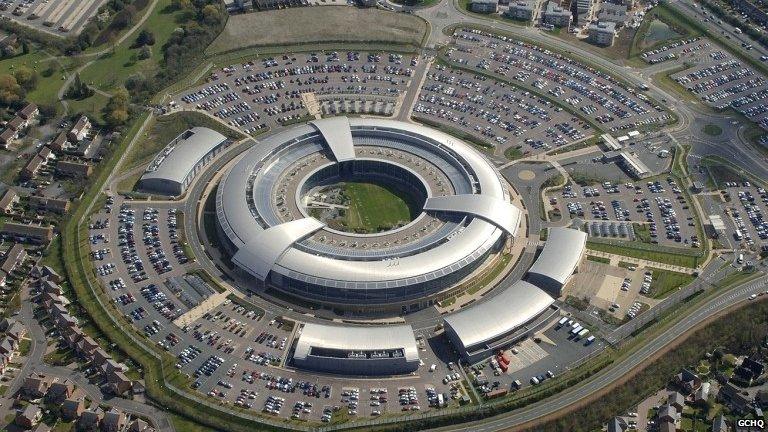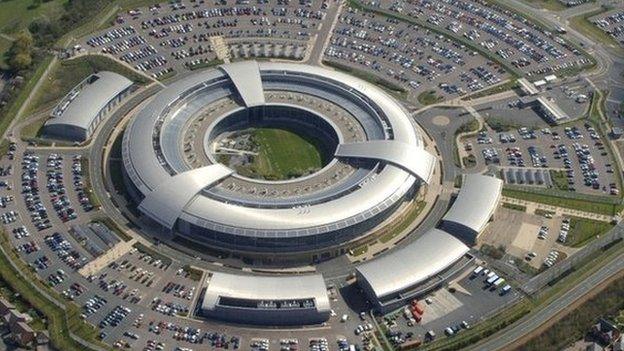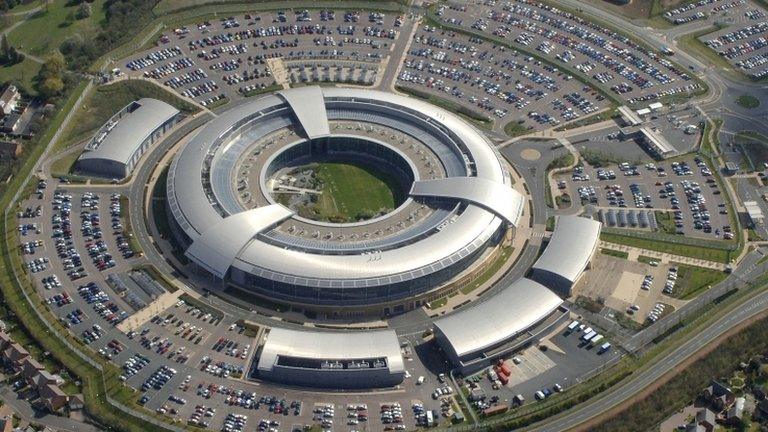Sturgeon presses Cameron on claims GCHQ can spy on MSPs
- Published
Nicola Sturgeon says she is "deeply disturbed and deeply concerned" by the claims
Nicola Sturgeon has written to David Cameron seeking urgent assurances that the UK's intelligence agencies are not spying on MSPs.
It follows reports that surveillance agency GCHQ is no longer applying the so-called Wilson doctrine in Scotland.
This bans the tapping of politicians phones, but was introduced in 1966 so does not cover the communications of members of the devolved parliaments.
The first minister said MSPs should be treated the same way as MPs and peers.
The Scottish Parliament's presiding officer Tricia Marwick has also written to the prime minister over the issue saying she would expect Holyrood to be consulted about any changes.
The Wilson doctrine, named after former prime minister Harold Wilson, protects MPs' phones and electronic communications, including emails.
GCHQ has previously also applied it to the communications of MSPs, however recent press reports have suggested that is now no longer the case, external.
Ms Sturgeon said she was seeking "urgent clarification on an apparent change of policy from GCHQ".
She also pointed out that the Scottish government had not been consulted on any changes.
In a letter to the prime minister, the first minister said: "I am sure you will agree with me that, excepting truly exceptional circumstances involving national security, the confidentiality of communications between parliamentarians and their constituents is of the utmost importance.
"I am sure you will also agree that it is just as important for MSPs as it is for MPs.
"This principle of confidentiality is what the 'Wilson doctrine' was introduced to protect."
Ms Sturgeon asked for responses to several questions including:
Are these reports correct in stating that there has been a change of policy and that GCHQ has ceased to apply the Wilson doctrine to the communications of MSPs?
If so, why was this decision taken, when and by whom was it taken, and was there any ministerial knowledge or approval?
Has there in fact been any interception of MSP communications?
The presiding officer's letter to Mr Cameron also sought "urgent clarification".
Ms Marwick said: "I feel strongly that all elected members should be treated in the same way, regardless of which Parliament or Assembly they are elected to, especially with regard to any communications a member has with his or her constituents.
"As Presiding Officer, I am responsible for safeguarding the interests of all members of the Scottish Parliament and I would therefore seek your urgent clarification on what guidelines exist in relation to members of the Scottish Parliament and whether there has been any change in the approach of the security services."
Scottish Labour's acting leader Iain Gray said it was "utterly unacceptable" for the communications between devolved representatives across the UK and their constituents to be monitored by GCHQ.
He added: "There needs to be full transparency from the UK government on this.
"We need to know urgently who decided on this major rule change and when. For the rules on spying on elected representatives across the UK to change without any sort of public scrutiny or accountability is a democratic outrage."
Data collection
Scottish Conservative MSP Murdo Fraser said: "Given the SNP devised the state guardian scheme and wants to meddle in people's lives to ludicrous extents, you'd think the party would welcome these reports.
"Perhaps the nationalists should think of this as being given a little named person of their own."

The Wilson doctrine covers phone calls and emails
The Scottish Liberal Democrats urged Scottish Secretary David Mundell to investigate the matter.
The party's justice spokeswoman Alison McInnes said: "The security services should be focused on catching terrorists and not spying on MSPs.
"We know the Tories have an utter disregard for our basic civil liberties but this seems to show a government spiralling out of control in its clamour for power."
Scottish Greens co-convener Patrick Harvie MSP described the claims about a change in guidelines as "deeply disturbing".
He said: "We must have a statement from ministers explaining the change. The privacy of parliamentary communications is a vital tool to protect the public interest."
Reports of the apparent change in policy with regard to MSPs emerged as the intelligence services' interception of politicians' communications data was being challenged at a hearing.
Green Party politicians Caroline Lucas and Baroness Jenny Jones and former Respect MP George Galloway have alleged the Wilson doctrine is being breached.
The trio say MPs' communications with the public are being intercepted as part of the Tempora mass data collection programme exposed by former US intelligence analyst Edward Snowden.
They have taken their case to the Investigatory Powers Tribunal which investigates complaints against the security services.
The Cabinet Office, which is taking the lead in matters concerning the Wilson Doctrine, issued a statement after a BBC Scotland request for comment.
It said: "Thanks for your query. We are not going to comment during ongoing litigation."
- Published23 July 2015

- Published2 July 2015

- Published22 June 2015

- Published6 February 2015

- Published5 December 2014
